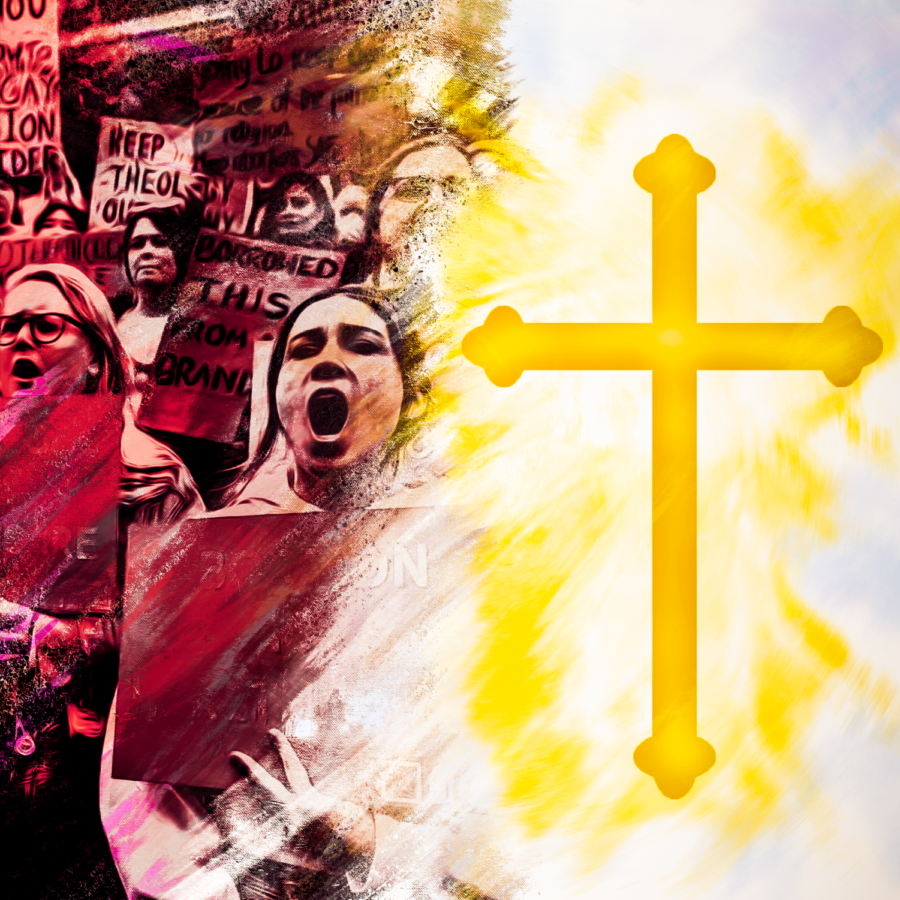Christianity vs Abortion – A Christian Girls’ Rendition
May 31, 2023
Being a teenage girl is an unspoken difficulty that exists in the lives of young women in 21st-century society. My generation contains a vast group of girls that are told “You are important”, “always stand up for yourself”, and “You are an equal”. But what does an ‘equal’ mean nowadays? If we are being taught the concepts of feminism and gender equality, then why are we also being vilified for protecting our autonomy? Abortion is perhaps one of the most controversial topics of our time. It can be an astonishing opportunity for women, but also defies religious beliefs and potentially supports the destruction of life. Thus, I see the procedure as one that sparks debate regarding the ultimate question – is abortion ethical?
Religion is a subtle guide to how we govern our society. It embraces ethical and moral practices communicated by religious customs, thus providing our world with a broad template of laws for governments to be guided. As a 17-year-old Christian girl who frequently serves the body of Christ, I have observed an astounding trend in my Christian friends’ opinions. Adolescent Christians tend to fall into two categories when the subject of the sanctity of existence arises: those who exhibit misdirected compassion, and those who enquire into the Bible’s concerns on the topic. To provide an improved understanding of the present obstacles in our motion, allow me to endeavour to disintegrate these groupings generically.
Firstly, several young Christians have concerns that favour contextual tensions of an unplanned pregnancy as opposed to expressing empathy for the injustices surrounding abortion arguments. Let me be unambiguous: Christians ought to demonstrate tremendous empathy to all women who are faced with a frightful pregnancy. But unlike the rest of society, our empathy must be distinct. Women will be urged to seek abortions by the world’s benevolence so they can achieve their goals and live fulfilling lives. Conversely, it should also be noted that one’s personal religious beliefs should not be the defining factor referring to abortion being ‘right’ or ‘wrong’. As the moral justification for opposing abortion is up to individual interpretation, it shouldn’t be prohibited by law. Those who believe abortion is ethically/religiously acceptable should be given the tools to do so, and those who do not believe in abortion should have the option not to have one. Then, a form of peace will be able to coexist between passionate Christians and fervent believers of women’s rights.
For those who enquire into the Bible’s concerns on abortion: the unborn and abortion are both heavily discussed in the Bible. It repeatedly extols the virtues of preserving unborn children’s lives. However, in a world where 31% of the population are Christians, it is extremely difficult to argue this notion to the 69% of non-believers who potentially advocate for the opposite of God’s viewpoint. As a Christian, I have often felt hatred directed towards religious people, which I do not condone. In fact, some of the most intelligent and valued people in our society hold religious values. In contrast, as a woman, I believe that our legislation should reflect a secular society, one that is equally applicable to all citizens.
Continuing, I believe we have to tackle several initial worries before looking more deeply at what the Bible teaches concerning abortion. While the majority of people who consider the Bible as a source of ethical guidance in this debate are Orthodox Christians and Jews, their pro-choice adversaries frequently charge them with trying to ‘force’ biblical values on individuals who reside in secular communities. Furthermore, pro-lifers are accused of ‘establishing religion’ when they apply the ethical standards of the Bible to promote legislation that forbids abortion and punishes those responsible for executing it. Essentially, they are accused of attempting to impose theocracy on the populace of a democratic, largely secular state.
Thus, I want to encourage you to consider the outlook that society will always be divided in controversial debates – fervent Christians and passionate pro-choice individuals perhaps may never be content with each other’s opinions. However, I believe it is innocuous to state that our coming generations of women should never feel threatened by the idea that their personal autonomy may be taken away. Are personal beliefs worth more than our women?












Rebecca • Jun 4, 2023 at 3:44 pm
Some things you should consider in your research that can affect all – those with or without religious belief:
* The psychological effects abortion has on a mother, often manifesting in serious mental health issues years later
* Interestingly, also the psychological effects on the father – often never considered
* The rights of the father of the child
* And most importantly the right to life of the child in-utero – where is his/her “opportunity”?
Monique M • Jul 6, 2023 at 6:06 pm
Hi Rebecca,
I appreciate your reply. Whilst I recognise your concerns as completely understandable, I’d like to add that my article focuses on my views as a Christian who also happens to be a girl. The notion of both female and male psychological effects, in conjunction with the rights of the child and father, are unquestionably well grounded – I wish not to dispute that. However, there are feasibly thousands upon thousands of other arguments that could be utilised when discussing the matter in question. As mentioned before, my article focuses on my perception, as a Christian, as a girl. If I were to discuss the countless other ideas, differing viewpoints, and every single individual impacted, my article would well exceed the 700 word limit I had whilst writing this piece.
Nonetheless, I would still like to provide a sense of clarity in regards to your comment. I want to sum up your concerns into two key points – one, being the psychological effects on both parties involved, and two, the rights of the “child”.
1. Abortion is not associated with mental health issues, according to more than 50 years of worldwide psychological research, but limiting the availability of safe, legal abortions causes harm. According to said research, those who are refused access to abortions have deteriorating conditions of mental and physical health as well as lower economic outcomes than those who seek and receive them. Contrary to popular assumption, the same research demonstrates that having a desired abortion does not significantly worsen psychiatric issues. In a groundbreaking study involving more than 1,000 women from 21 American states, those who were permitted to have an abortion had no higher likelihood of reporting distressing feelings, mental health symptoms, or suicidal thoughts than those who were not. Five years later, 97% of those studied stated that having the abortion was the right decision. “It’s important for folks to know that abortion does not cause mental health problems. What’s harmful are the stigma surrounding abortion, the lack of knowledge about it, and the lack of access.” (Debra Mollen, PhD, a Professor of Counselling Psychology at Texas Woman’s University, who studies abortion and reproductive rights). (Information collected from the American Psychological Association).
Continuing, the notion of abortions not manufacturing serious mental health issues in women can also be presumed for men. Whilst I understand that having the procedure can (and likely will) lead to a significant emotional response, there is, once again, no concrete evidence that abortions will induce negative mental health problems. Professor Kirsten Black (PhD, Obstetrics, Gynaecology and Neonatology – The Sydney University Central Clinical School) sums it up beautifully: “There can be emotional repercussions from abortion, and for some women and men these are significant. While individual experiences need to be heard and supported, it is important to recognise that large studies find no detrimental psychological impact from abortion. Australian women need accurate information when making decisions on induced abortion. It is irresponsible to describe a syndrome for which there is no evidence nor support from national and international mental health experts.”
2. The rights of the “child”. Honestly, I’m not too sure where to begin here. This is such a big topic, one that is also extremely debatable, which is why I’m choosing to not discuss when life truly begins (some argue at conception, others argue 2 weeks, others argue 10. I’m not a doctor. I cannot speak on this). However, I would like to point out one simple concept – The wording of the “right to life” is explicitly premised on birth in the Universal Declaration of Human Rights, which serves as the fundamental basis of human rights. Similarly, other international and regional human rights accords, as originally written and/or subsequently construed, categorically reject arguments that human rights should begin to exist at the moment of conception or any time before birth. Additionally, they acknowledge that restrictive abortion regulations jeopardise women’s right to life as well as other fundamental human rights (National Library of Medicine). Essentially, what I’m trying to say is that the mother of the “child” obtains numerous human rights, all of which outlined and protected within international law. Who’s to say, theoretically, that the unborn “child” has the “right” to breach these laws, which are enshrined within charters of international organisations such as the United Nations? Who’s to say, theoretically, that the “child’s” life is more important than the mother’s, and should be delivered no matter the cost? I could talk about circumstances including but not limited to sexual assault, economic instability, or plain old personal reasons (which is simply not our business) but I won’t as I believe they’re relatively self-explanatory.
I wish to end with one last point – I risk maintaining the assumption that you are a pro-life individual (please, correct me if I’m wrong). I respect this. However, if the procedure one day is outlawed (corresponding with your viewpoints), do you believe that this would solve the debate? That mothers, fathers, and the “child’s” rights will be protected? That mothers, most significantly, will be safe? If your answer is ‘yes’ – I’d genuinely love to hear why. If ‘no’, then my point stands.
So… in summary – Yes, I’ve considered all of the above in my research. No, the above does not effect my religious beliefs (since the article is based upon my viewpoint).
I’m happy to discuss this further if that is something of interest to you. I hope this gives some justification to my article 🙂